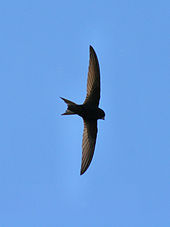David Lack
David Lambert Lack FRS[1] (16 July 1910 – 12 March 1973) was a British evolutionary biologist who made contributions to ornithology, ecology, and ethology.His father then considered entomology which was then the only professional field in zoology and found work for David at the Frankfurt museum in the summer of 1929.[13] He joined the Cambridge Ornithological Club whose members included Peter Scott, Arthur Duncan, Dominic Serventy, and Tom Harrisson.[16] After Cambridge, Lack, on the recommendation of Julian Huxley took up a position as a science mentor at Dartington Hall School,[17] Devonshire from 1934 until Summer 1938 when he took a year off to study bird behaviour on the Galapagos Islands.April to August 1939 was spent at the California Academy of Sciences which held a large collection of the finches of Galapagos that had been studied earlier by Harry Swarth and at Ernst Mayr's home in New Jersey.[23] Lack was committed to pacificism and debated the philosophy even during his Dartington days with the founder of the college, Leonard Knight Elmhirst.During this work he met other biologists who had been inducted into the war including George Varley, an entomologist who introduced him to the idea of density-dependent regulation of animal populations.His work suggested that natural selection favoured clutch sizes that ensured the greatest number of surviving young.He would make students work on their papers and give only one reading to their thesis asking them to choose either a draft or a final version to submit.The effect of this change in interpretation is to put the emphasis for speciation onto natural selection for appropriate food handling instead of seeing it primarily as a by-product of an isolating mechanism.In this way his work contributed to the modern evolutionary synthesis, in which natural selection came to be seen as the prime mover in evolution, and not random or mutational events.[33] Lack's work feeds into studies of island biogeography which continue the same range of issues presented by the Galapagos fauna on a more varied canvas.She wished to join the Royal Academy of Music in London but the war led to her serving in the Auxiliary Territorial Service as an ambulance driver in Europe.After the war she applied for work and due to her interest in birds she sent her resume to Richard Fitter who passed it on to David Lack with a note "Here's another for your reject file."[45] Lack's parents belonged to the Church of England, and he was an agnostic as an early adult but became a convert to Anglicanism in 1948, possibly influenced by Dan and Mary Neylan, friends at Dartington Hall.[47] This book foreshadows, in some ways, the non-overlapping magisteria conception of the relationship between religion and science later popularised by Stephen Jay Gould.Arthur Cain remarked of him, "David Lack was the only religious man I knew at that period who did not allow his religion to dictate his view of natural selection.
Eric HoskingUniversity of CambridgeLack's principleElizabeth LackAndrew LackGodman-Salvin MedalDarwin MedalOrnithologyUniversity of OxfordEdward Grey Institute of Field OrnithologyMonica M. BettsDavid W. SnowWilliam J.L. SladenPhilip AshmoleRobert HindeIan NewtonChris PerrinsBernard StonehouseRobert H. MacArthurevolutionary biologistethologyfinches of the Galapagos Islandsgroup selectionBritish Medical AssociationLondon HospitalIndian armyGresham's SchoolHolt, NorfolkMagdalene College, CambridgeRoyal Society for the Protection of BirdsSenckenberg MuseumPeter ScottArthur DuncanDominic ServentyTom HarrissonJulian HuxleyDartington HallDevonshireGalapagos IslandsJoseph GrinnellRobert McCabeCooper Ornithological ClubErnst MayrSS BremenCalifornia Academy of SciencesHarry SwarthNew JerseyDartington Hall SchoolEva IbbotsonR.E. MoreauLeonard Knight ElmhirstWorld War IIBritish ArmyGeorge Varleyradar ornithologybird migrationW.B. AlexanderOxford Universitypopulation biologyclutch sizesV.C. Wynne-EdwardsnidicolousEuplectes hordeaceaDarwinGalapagosDarwin's finchesPercy Loweisolating mechanismsmodern evolutionary synthesisnatural selectionPeter and Rosemary GrantJ.B.S. HaldaneRobert GillmorAndrewBibcodeAllen & UnwinEvolutionFellow of the Royal Society (FRS) in 1951British Ornithologists' UnionInternational Ornithological CongressBritish Ecological SocietyRoyal SocietyEdward Grey InstituteRichard FitterWytham WoodsPark Town, OxfordBoars HillNon-Hodgkin lymphomaAnglicanismnon-overlapping magisteriareligion and scienceStephen Jay GouldArthur CainThorpe, W. H.Biographical Memoirs of Fellows of the Royal SocietyCambridge University PressOxford University PressFellowsin 1951Carlyle Smith BealsJohn BoydDavid CatchesideHerbert FröhlichHans HeilbronnGerhard HerzbergJoseph HutchinsonThaddeus MannKurt MendelssohnAlbert NeubergerLeonard Bessemer PfeilJames Arthur PrescottMaurice PryceWilliam John PughJohn Ashworth RatcliffeThomas Alan StephensonWilliam Homan ThorpePetrus Johann du ToitAlan TuringAlfred UbbelohdePrince Philip, Duke of EdinburghHerbert McLean EvansKarl LashleyCarl StørmerRalph Walter Graystone Wyckoff